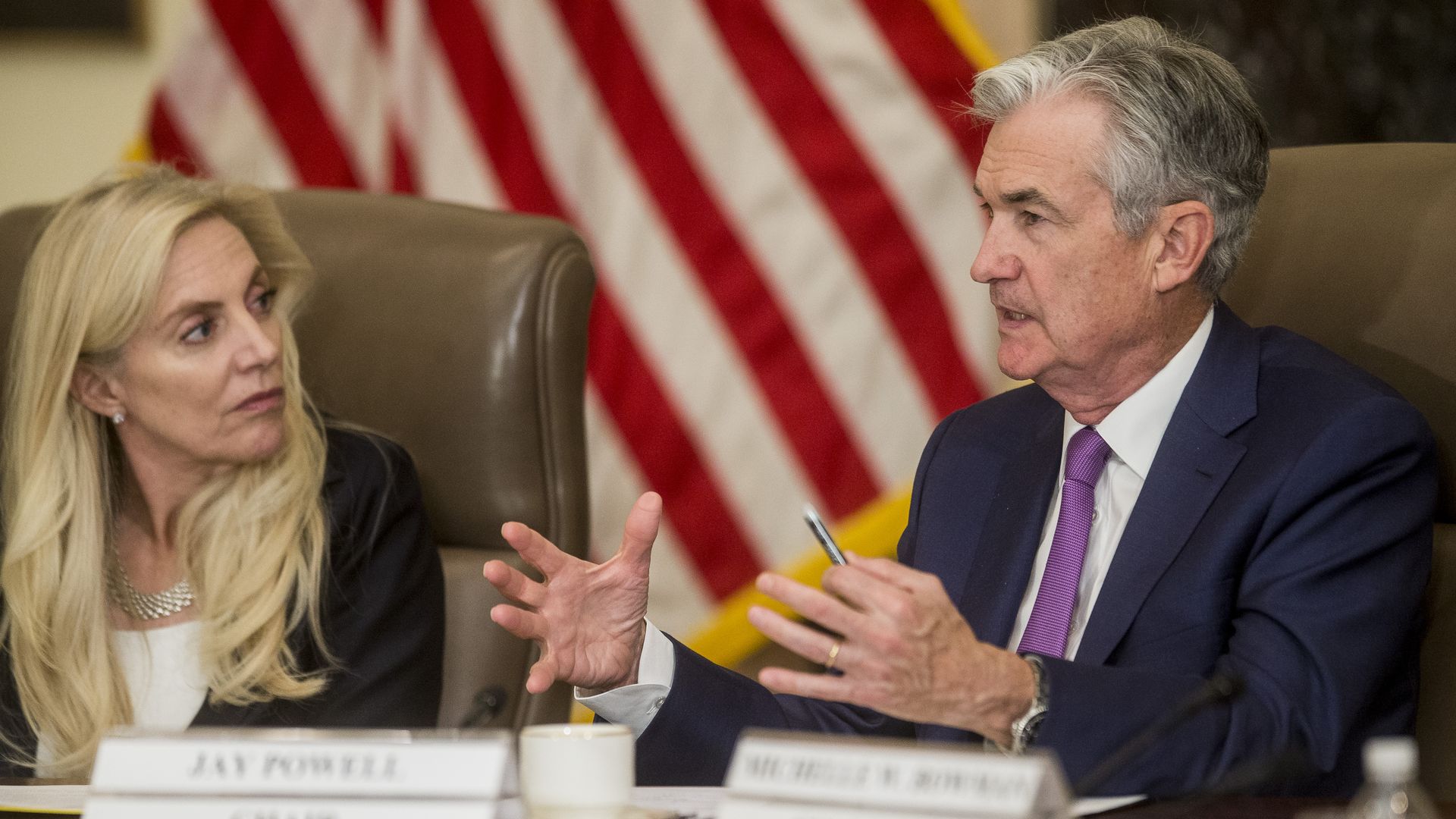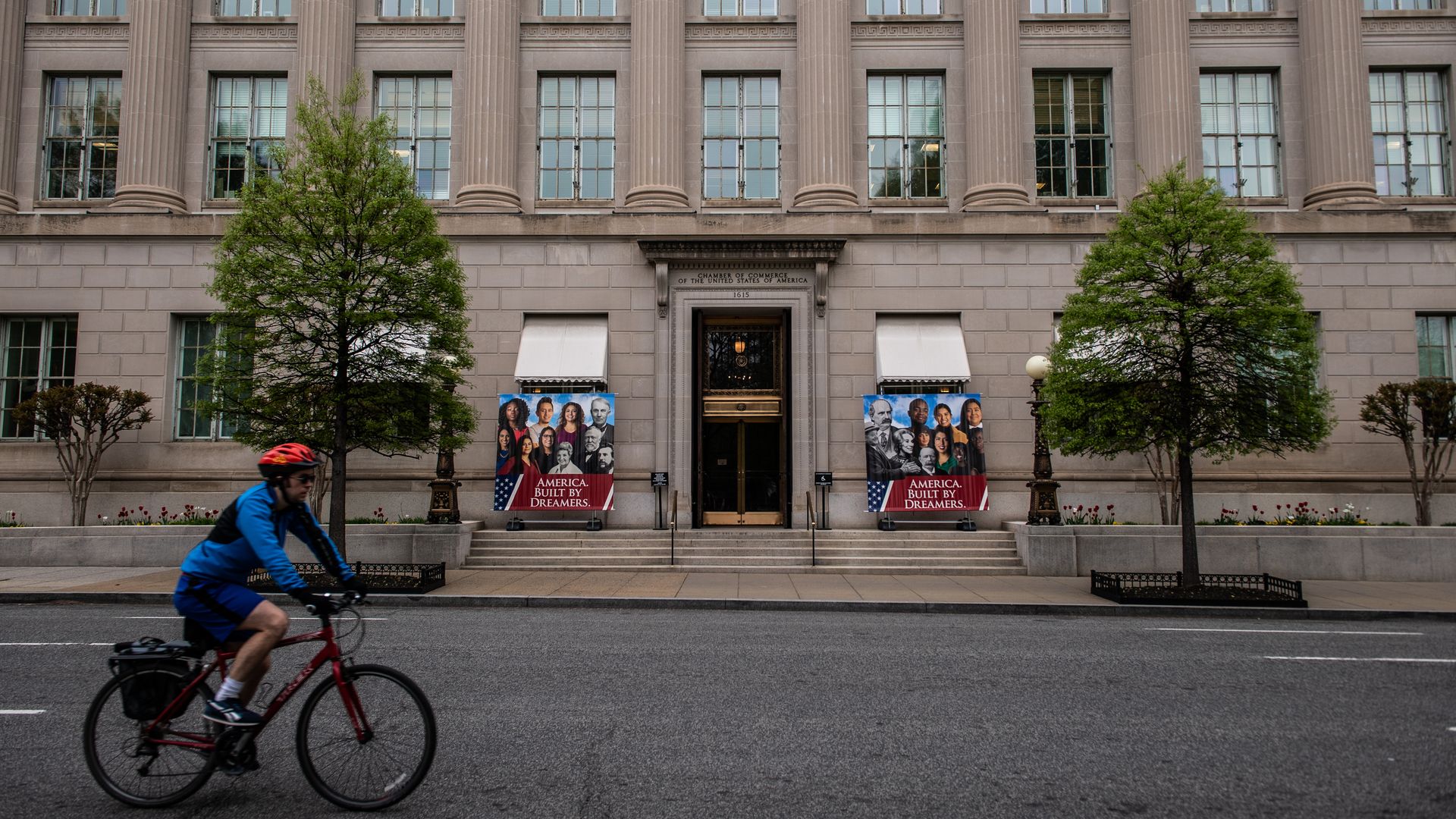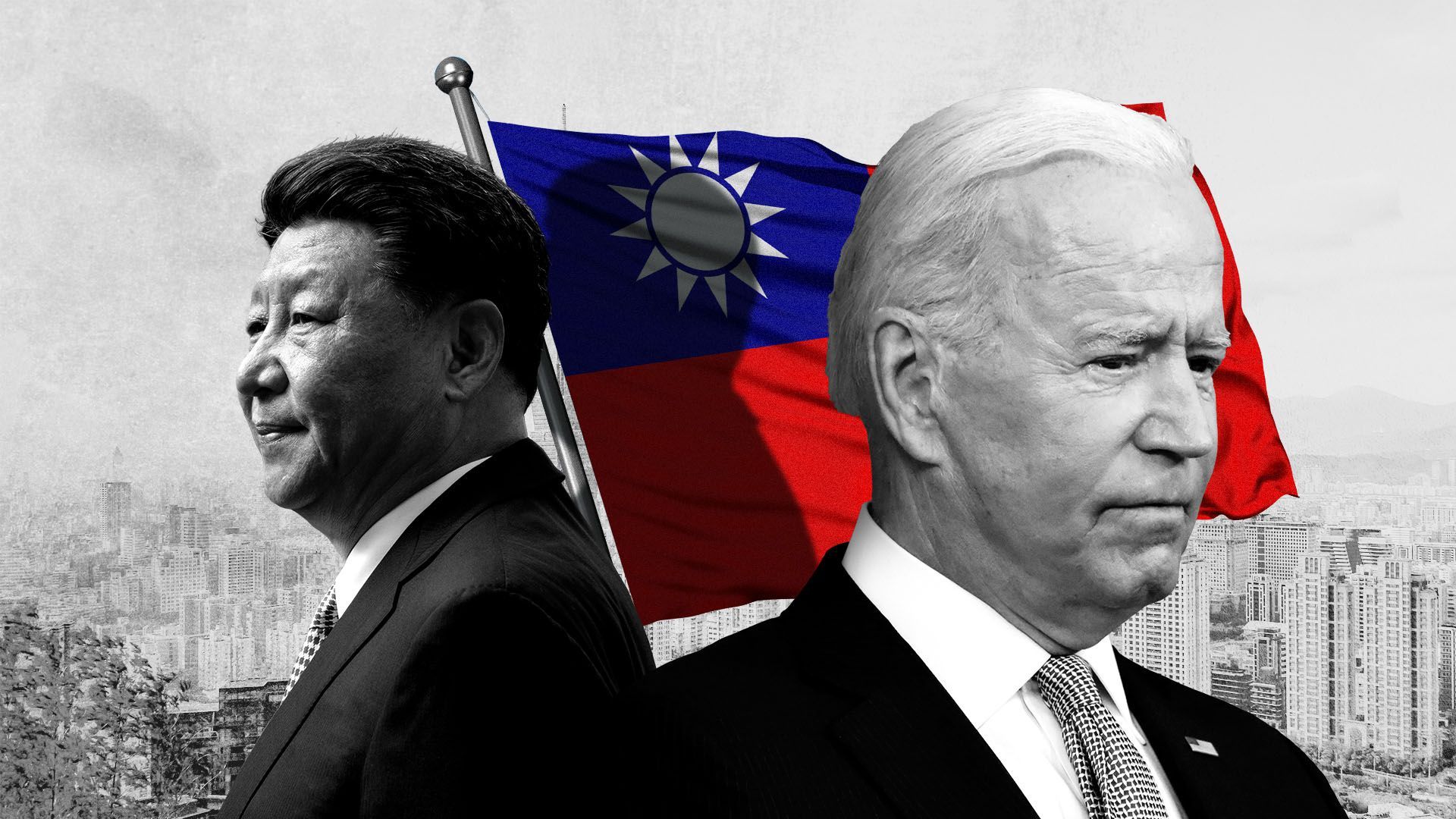| | | | | | | Presented By OurCrowd | | | | Axios Sneak Peek | | By the Axios Politics team ·Oct 04, 2021 | | Welcome back to Sneak. 🏢 Join Axios' Sara Fischer, Nick Johnston and Aja Whitaker-Moore tomorrow at 12:30pm ET for a virtual event about the value of workforce development in a rapidly changing job landscape. Guests include Sen. Mark Warner (D-Va.), Rep. Alma Adams (D-N.C.) and president of Spelman College Mary Schmidt Campbell. Register. Smart Brevity™ count: 1,428 words ... 5.5 minutes. Edited by Glen Johnson. | | | | | | 1 big thing: The GOP's Fed warning |  | | | Lael Brainard listens as Federal Reserve Chairman Jerome Powell speaks in October 2019. Photo: Zach Gibson/Bloomberg via Getty Images | | | | Senate Republicans are warning President Biden not to nominate Lael Brainard, currently a Fed governor, to replace Federal Reserve Chair Jerome Powell — hinting she could face a difficult confirmation process, Axios' Hans Nichols reports. Why it matters: With a 50-50 Senate locked in a dangerous standoff over the debt ceiling, the president has to decide how much political capital he's willing to expend by passing over Powell, a Republican nominated by former President Trump, to put his own stamp on the Fed. - Banking committee Republicans are seizing on the current economic uncertainty, with the U.S. staring at a potential debt default and supply chain disruptions from COVID-19, to force Biden to renominate Powell.
- "I wouldn't vote for her," Sen. Richard Shelby (R-Ala.) told Axios tonight. "She's too liberal. You'd have a tough confirmation fight."
- "It's a concern for us, just because you have Jay Powell who is experienced and has proven himself to be a very good leader," said Sen. Mike Rounds (R-S.D.). "I think she's a bit more liberal in terms of her view of a proactive Federal Reserve."
Driving the news: Biden faces an October laden with political risks and economic uncertainty — with big deadlines in the middle of the month. - The Treasury Department will run out of money to service its debt on Oct. 18. The president warned today of a "meteor headed to crash" into the economy.
- The term for the Fed's vice chair for bank supervision, a powerful position currently held by Trump appointee Randal Quarles, expires on Oct. 13.
- The chair's own term expires in February 2022, but presidents typically nominate someone months ahead of time to allow financial markets to process the news.
What they're saying: The White House says it doesn't feel pressured by the calendar. - "The president will continue to engage with his senior economic team in a careful and thoughtful process to appoint a Federal Reserve chair in a timely manner," a White House official told Axios.
The big picture: After an extraordinary 18 months of combating the economic impacts of COVID-19, the Federal Reserve has been buffeted by allegations that some of its officials, including Vice Chair Richard Clarida and two regional presidents, profited from bank policy decisions. - Sen. Elizabeth Warren (D-Mass.) has asked Gary Gensler, chair of the Securities and Exchange Commission, to "determine if any of these ethically questionable transactions may have violated insider trading rules."
- "It makes sense to investigate this and to consider whether the existing rules are adequate," Sen. Pat Toomey (R-Pa.), the ranking member of the Senate Banking Committee, told reporters this evening.
Keep reading. |     | | | | | | 2. Scoop: U.S. Chamber backs off BIF |  | | | The U.S. Chamber of Commerce headquarters. Photo: Salwan Georges/The Washington Post via Getty Images | | | | The U.S. Chamber of Commerce is withdrawing its support of the Senate-passed $1.2 trillion bipartisan infrastructure bill just hours after Punchbowl News reported House Republicans were booting it from its strategy calls, Axios' Alayna Treene has learned. Why it matters: The Chamber's chief policy officer, Neil Bradley, announced the policy shift in a letter to its Board of Directors today. The pretense for his decision: President Biden formally linking the "hard" infrastructure bill with the $3.5 trillion budget reconciliation package during a meeting with House Democrats on Friday. Between the lines: The two bills, which are seen as the top priorities in fulfilling Biden's agenda, have long been linked. House Speaker Nancy Pelosi (D-Calif.) has described them as "companion bills." - This is the prime reason House Republican leaders have been whipping against the bipartisan bill, despite multiple GOP senators having voted for it in the Senate — including Minority Leader Mitch McConnell (R-Ky.).
- The Punchbowl News story about the decision to cut the Chamber from its strategy calls was largely seen as a formal rejection of the pro-business organization after months of fraying relations.
- Many Republicans also have criticized the Chamber for endorsing some Democrats in recent years.
In his letter, obtained by Axios, Bradley pointed specifically to the news the infrastructure bill would not be voted on first. - "The events of the last few days make it all the more crucial that everyone across the business community does everything in our power to ensure the reconciliation bill does not pass. While the Chamber believes that passing infrastructure as a stand-alone bill prior to consideration of the reconciliation bill would have enhanced our position, that is no longer a realistic possibility," Bradley wrote.
- That's something that also prompted several moderate House Republicans — who'd previously planned to vote in favor of the $1.2 trillion bill — to pull their support.
|     | | | | | | 3. First look: States can break filibusters easier than feds |  Data: RepresentUs analysis; Chart: Kavya Beheraj/Axios. Note: Some states have multiple ways to break filibusters. For states with rules on filibuster-breaking votes, some require a certain share of senators to be present and others require a certain share to vote. The vast majority of state Senates have rules making it harder to filibuster legislation than in the U.S. Senate, according to new research from the non-partisan advocacy group RepresentUs that was reviewed by Axios' Stef Kight. Why it matters: This comes as Senate Republicans threaten to filibuster raising the debt ceiling, calling on Democrats to do it alone. Requiring 60 votes to close debate on a particular legislative topic has been a major factor of partisan gridlock in Congress — especially in the current 50-50 Senate. - "Not only are Republicans refusing to do their job, but they're threatening to use their power to prevent us from doing our job — saving the economy from a catastrophic event," Biden said Monday. "I think, quite frankly, it's hypocritical, dangerous and disgraceful."
By the numbers: Lawmakers in 43 states have an easier time breaking a filibuster than members of the U.S. Senate, according to the analysis of state laws and rules. - Four states have pre-set time limits on debate, which the U.S. Senate lacks. Many states require only a majority to end debate.
- Seven state Senates have rules similar to the U.S. Senate's cloture rule. They don't have time limits and require a high share of senators to set limits or end debate. Four of those do not have any specified rules for ending debate at all.
"Rules matter, but they're not the only thing that determines the filibuster," Caroline Joseph, RepresentUs research analyst, told Axios. - States with the most similar rules to the U.S. Senate do not have significant problems with the lawmakers filibustering.
- On the other hand, Missouri only requires a majority to end debate — but has some of the most frequent filibusters of any state.
|     | | | | | | A message from OurCrowd | | Indoor GPS helps stores recover revenue lost on unfound products | | |  | | | | Unfound products mean lost sales. Oriient, the first software-only indoor GPS, gets customers what they want with 20x better accuracy than today's top options. With no installation required, Oriient is scalable for any store. Invest now at OurCrowd. Explore Oriient's investment potential. | | | | | | 4. Biden's Taiwan test |  | | | Photo illustration: Sarah Grillo/Axios. Photos: Anna Moneymaker, Yorgos Karahalis/Bloomberg via Getty Images | | | | The Chinese military has flown a record 145 fighter planes into Taiwan's air defense identification zone (ADIZ) during the past four days, escalating Beijing's campaign of intimidation toward the self-governing island. Why it matters: Biden has emphasized the need to ensure his strategy of "vigorous competition" with China "does not veer into conflict." China's growing aggression toward Taiwan is drawing fresh fears of a catastrophic war and threatens to put that rhetoric to the ultimate test, Zachary Basu writes for Axios World. Driving the news: The People's Republic of China commemorated its 72nd annual National Day on Oct. 1 by sending 38 warplanes through Taiwan's ADIZ. That record stood until the following day — when it sent 39 more. - State media hailed the incursions as a form of "military parade," while the State Department condemned the flurry as "provocative." It reiterated the United States' "rock-solid" commitment to Taiwan.
- Undeterred, China sent another 52 jets into the ADIZ on Monday. Taiwan's foreign minister told Australian television that the island was preparing for war and urged Australia to increase security cooperation.
- Chinese state media, known for its hostility toward Taiwan and the West, responded by asking whether Australia was "willing to accompany Taiwan separatist regime to become cannon fodder."
The big picture: During a speech earlier this year, President Xi Jinping of China pledged "complete reunification" with Taiwan. The mainland Communist government views it as a breakaway province that must be brought to heel — including by force, if necessary. - These are not idle threats: China has crushed democracy in Hong Kong, once a semi-autonomous territory where Chinese nationals enjoyed rare political freedom, and fortified its military presence in the disputed South China Sea.
- The U.S. has strengthened its ties with Taiwan over the last several years and sold the island billions of dollars worth of weapons, infuriating China.
- Consecutive administrations have purposely maintained a posture of "strategic ambiguity" on the question of whether the U.S. would defend Taiwan from a Chinese invasion.
- This ambiguity has the effect of both deterring China and motivating Taiwan to invest in its own defenses, former White House national security adviser H.R. McMaster told Axios.
|     | | | | | | 5. Pic du jour: Coffee run |  | | | Photo: Sarah Silbiger/UPI/Bloomberg via Getty Images | | | | Vice President Kamala Harris is joined by D.C. Mayor Muriel Bowser (left) and store founder Daniella Senior after visiting the Colada Shop, a Cuban cafe in Washington. - Harris met Senior last week during a meeting with Latina small-business leaders.
|     | | | | | | A message from OurCrowd | | This indoor GPS is 20x more accurate than WiFi solutions | | |  | | | | Using earth's magnetic field, Oriient's hardware-free indoor GPS is highly scalable and offers the best accuracy. This software-only solution helps the 67% of shoppers who leave without finding what they want, so stores recover revenue. Explore Oriient's investment potential at OurCrowd. | | | | 📬 Thanks for reading. A reminder that your family, friends and colleagues can subscribe to Sneak or any of Axios' other free newsletters through this link. |  | | It'll help you deliver employee communications more effectively. | | | | | | Axios thanks our partners for supporting our newsletters. If you're interested in advertising, learn more here.
Sponsorship has no influence on editorial content. Axios, 3100 Clarendon Blvd, Suite 1300, Arlington VA 22201 | | | You received this email because you signed up for newsletters from Axios.
Change your preferences or unsubscribe here. | | | Was this email forwarded to you?
Sign up now to get Axios in your inbox. | | | | Follow Axios on social media:    | | | | | |
No comments:
Post a Comment